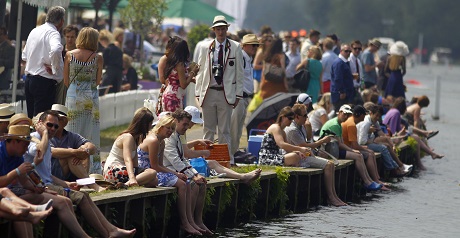Ignore the blazers, Henley Royal Regatta is about top class rowing
Henley Royal Regatta, which take place this week, is often written off as a glorified garden party: jolly, boaty types in silly blazers drinking Pimms and barely noticing the event on the river nearby.
It has arcane rules – in the main enclosure, men are not allowed to remove their jackets on anything but the hottest days, while ladies are required to wear skirts or dresses below the knee. Stern-looking men in bowler hats are on hand to enforce the regulations.
“We don’t have to report Henley, do we? It’s just a load of public school types in blazers,” a former BBC colleague once said to me. It’s a line the national media seem to follow increasingly, with only one or two newspapers now offering the regatta any space at all.
Critics blinded by the airs and graces off the water, though, miss the quality of the racing on the water. It’s like ignoring Wimbledon because it’s all picnics, parasols, strawberries and cream.
Nine crews from Great Britain’s national squad – including the European champion coxless four featuring double Olympic gold medallist Andy Triggs Hodge – will compete at Henley as part of their preparations for the World Championships at the end of August.

Some of the best of the rest of the world are there too, including Olympic champion single scullers Mahe Drysdale from New Zealand and Mirka Knapkova of the Czech Republic.
Drysdale is aiming to win the Diamond Challenge Sculls event for the fourth time, but must overcome his British friend Alan Campbell (pictured above) to do so.
Olympic bronze medallist Campbell, who rows for Chiswick club Tideway Scullers School, is chasing his third Diamonds win.
What makes Henley special for Campbell?
“Everything from the tradition, the side-by-side racing, the best in junior, club, university and international all racing at the same regatta, the trophies and the stadium effect by having so many supporters line the banks from the start to the finish,” he says.
“You can almost touch the spectators – there is no other regatta like that.”
Even the image of the stuffy enclosures is only part of the picture: most of the towpath along the course is free to enter and free from rules and regulations.
There are 20 events in all, including nine for international-standard men and women, three club events, two for students and three for juniors.
A men-only event until the early 1990s, Henley welcomed schoolgirl crews for the first time in 2012. The defending champions in schoolgirl quad sculls are Hammersmith’s Latymer Upper School.
West London crews and athletes to look out for at Henley:
Great Britain’s world champion men’s eight faces France in Henley’s blue riband event, the Grand Challenge Cup on Sunday. Constantine Louloudis, who grew up in Maida Vale and led the crew to bronze at the 2012 Olympics, is a late addition in the GB line-up.
Three members of Molesey Boat Club – Olympic medallists Triggs Hodge, George Nash and Moe Sbihi – feature in the GB coxless four, whose strongest rival looks likely to be Germany in the Stewards’ Challenge Cup.
John Collins, who rowed as a youngster at Putney Town and Tideway Scullers, is one half of the Great Britain entry in the Double Sculls Challenge Cup, along with Johnny Walton.
Drysdale and Campbell have rowed together in the past for Tideway Scullers but they could go head-to-head on Sunday as Drysdale of New Zealand goes for his fourth Henley title, while Brit Campbell eyes his third.

Great Britain’s lightweight quad scull – racing as Molesey BC and Putney Town – must beat their club-mates in Friday’s first round of the Princess Grace Challenge Cup in order to book a Saturday meeting with GB’s heavyweight quad.
Putney-based Thames Rowing Club are desperate to win a men’s eights event at Henley for the first time since 1948. Henley’s Upper Thames RC and Mercantile of Australia look like their biggest rivals.
Thames RC also have a chance of victory in the Wyfold Challenge Cup for coxless fours. Their neighbours Vesta RC are among the contenders in the Britannia Challenge Cup for coxed fours and,
The Putney Embankment is also home to Imperial College – who are in the hunt in the Prince Albert Challenge Cup for student coxed fours – and Westminster School, favourites in the Fawley Challenge Cup for junior quads.
St Paul’s School from Hammersmith and Hampton School have their eyes on the Princess Elizabeth Challenge Cup for junior eights, although Abingdon will aim to win the title for the fourth successive time.
Martin Gough writes the weekly rowing blog The Rowlup – http://hugga.com/blogs/the-rowlup – out every Friday
Follow West London Sport on Twitter
Find us on Facebook


14/08/2014 @ 10:27 am
Excellent piece, I agree that there is a certain image that rowing portrays although somewhat justified. I think it can be a sport that is difficult to get into and find how and most importantly WHERE you can try it out. The website, http://mylocalpitch.com/ is excellent for finding venues for lots of sports, including rowing! Well written piece and great to have an more in depth insight into the sport.